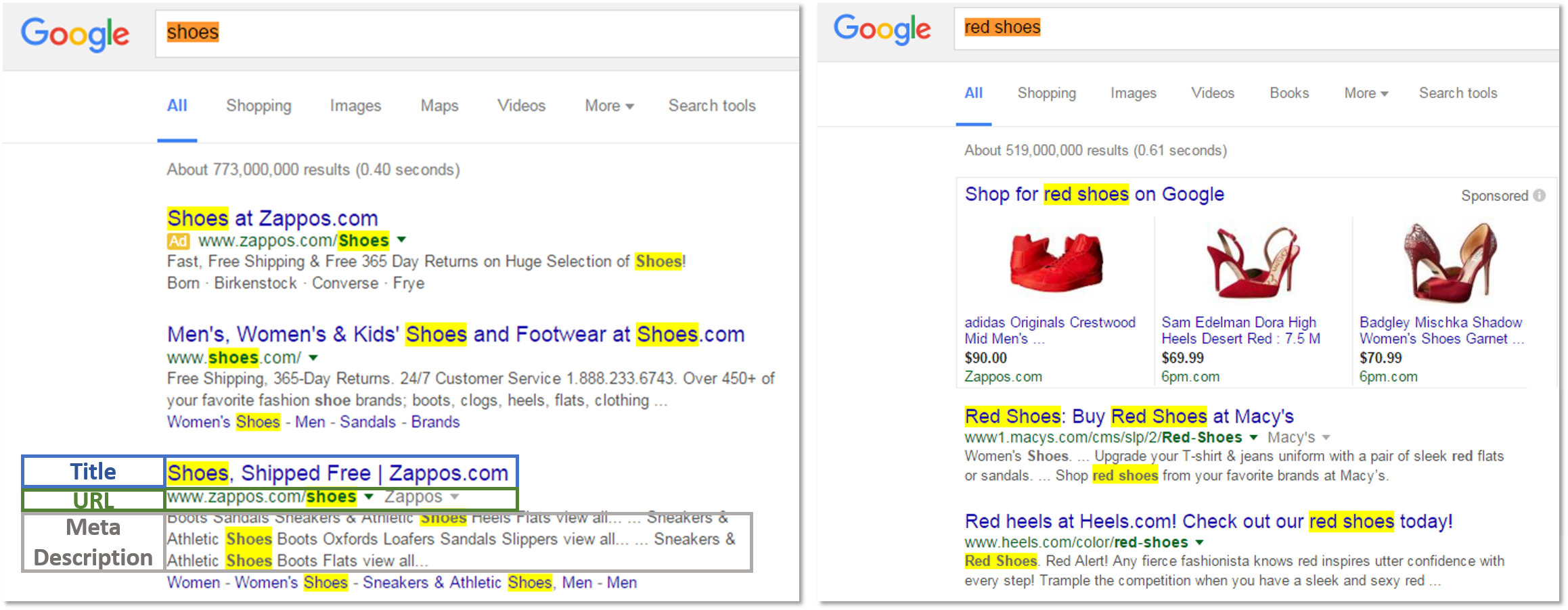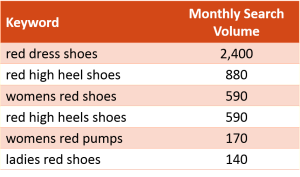Search Engine Optimization (SEO) is incredibly complex and ever-changing. SEO experts and consultants spend years trying to fully comprehend search engine algorithms. That being said, it can be broken down into 4 main categories. I hope these simple ABC’s will help you begin to grasp the importance and complexity of SEO.
Let’s say you want to search for shoes online. You may go to Google.com, Bing.com, or Yahoo.com. Since a large majority of people worldwide utilize Google and other search engines mimic Google, we will focus on that search engine. So you go to Google and may type “shoes,” “red shoes,” “buy cheap shoes online,” or “jimmy choo shoes.” These different phrases you searched are called keywords. Each one of these keywords will display different results because Google wants to display the most relevant content for your query.
Now if you are a business and you want to rank for one of these terms, here’s what Google will review:
A: Architecture & Technical Elements
The first item Google will look at is the Architecture & Technical Elements of your website. This relates to website development or how your website is coded. Search engines have to easily find and “read” content on your site. You’d be surprised how many different websites are not search engine friendly. You’d be even more surprised to find that changing one line of code on your website can make or break you, such as a robots.txt disallow: / code or incorrect canonical tags. This particular topic is incredibly confusing and it is highly recommended to hire an SEO consultant who can fully comprehend technical SEO or has a web development background.
Since this post is not to provide best practices, but rather help you understand SEO, I plan on creating an additional post about technical SEO best practices.
B: Backlinks & Authority
The second item Google will look at is your online Authority by reviewing your website’s Backlink profile. To best explain what this is, it may be easiest to explain this from a user’s perspective. Let’s say for example you are writing a blog about “shoes” and you have to link to a website. You will probably want to make sure it is a good reference for your users. Who would you link to? Shoes.com, Zappos.com, Nordstrom.com? Now, what if you are writing a news article and you need to link to a reference so that users know your material is based on fact. Who would you link to? CNN.com, NBC.com?
If you think about this from Google’s perspective, Google wants to provide users with content that is the most relevant as well as the highest authority on a particular subject. How do they do this? By looking at the quantity and quality of third party site links, called your backlink profile. If you are trying to rank for shoes and you want to increase your online authority for shoes, it would behoove you to get a larger quantity of third party sites to link to you, but not just that. These websites should also be high authority. If Shoes.com or Nordstrom.com links to your website, that is 100X more valuable than thousands of links from low authority sites such as 99sweetshoes12.com… (I just made that website up, but hopefully that gets the point across).
This particular topic is incredibly complicated especially when trying to increase your online presence internationally. There are many blogs that are solely focused on this topic such as the Content Marketing Institute. I plan on expanding upon this topic and providing best practices throughout my blog posts.
C: Content & Keywords
Content is in a way, obvious. If a user is searching for “shoes,” obviously Google will want to rank a page that is about shoes. Though, there are some elements on an HTML page that you must make sure contains the keyword(s) you want. For example, if you want to be visible for users that search “shoes,” you will need to make sure your URL, Title tag, Meta Description, Header tag(s), and on-page text contains “shoes.” Furthermore, if your page is more specific to “red shoes,” you will need to make sure all page elements contain “red shoes.” See an example of how other websites optimize for “shoes” or “red shoes.”
The secret to SEO success is making sure you choose the right type of keywords that you know you can rank for. For example, if you want to rank for shoes, but Zappos and Macy’s rank, maybe you won’t be able to rank on the first organic page for “shoes” because you cannot compete with these large, authoritative brands. But, what if you can find the perfect phrase where you can rank and get enough traffic such as “red dress shoes?” This phrase may be less competitive and easier for you to compete with other websites. Therefore, it is important to really spend time researching the right type of keywords for your site.
After you research keywords, you will want to choose 3-4 main keywords as a theme for your entire site. Furthermore, you will want to map 3-4 unique keywords per page. These 3-4 unique keywords should play off of one another. As for one-page example, if you want to target people searching for red shoes, you may want to choose the following keywords: “red dress shoes,” “red high heel shoes,” and “women’s red shoes” based on search volume (see research below).
There are many additional best practices around content and keywords, but this highlights the main concepts.
S: Social Media
Social signals is another way Google can tell if you are an authoritative figure. Let’s say you found the perfect pair of red high heel shoes and you share it with your friends on Twitter or Google Plus, such as this page (Nordstrom). That social share is essentially like a vote. You are “voting” that Nordstrom’s particular page is relevant and authoritative for red high heels.
So Google will look at the number of social shares and the amount of engagement (e.g. likes) on a particular web page. Furthermore, Google will look the number of subscribers or followers and amount of engagement on your brand’s social media profiles in order to determine how authoritative you are online.
Knowing this, it would behoove you to not only create social media profiles but gather quality engagement for such. This would mean possibly hiring a social media agency or services to help support you and stay competitive online.
Summary
This just highlights the very basics or the ABC’s of SEO. To have a full SEO 101 session, specific to your business, feel free to contact Cassandra: Cassandra.Gucwa@gmail.com.


